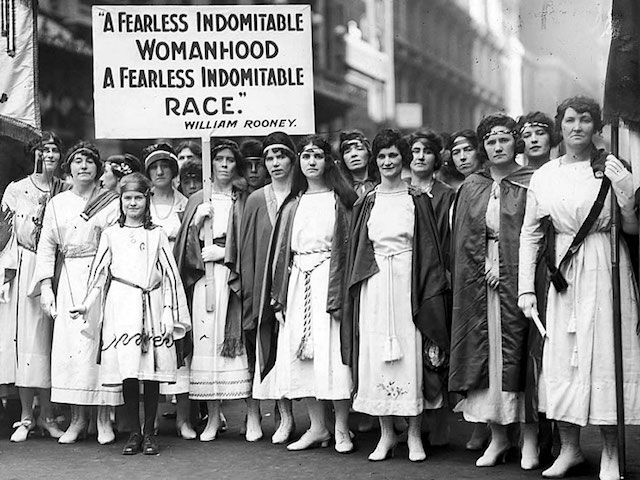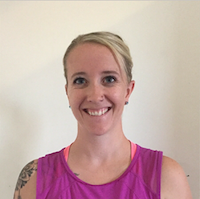I have a horrible confession to make: as a young woman, I was staunchly an anti-feminist.
I bought into the common notion of the late 80s and early 90s that feminists were just a bunch of bra-burning, angry, ugly women who couldn’t get laid.
I couldn’t have been more wrong.
It wasn’t until I was in my late 20s that I realized that feminism was about being treated equally—that being a woman didn’t mean that I was less than. I didn’t realize it was about a woman’s right to own her body and control who touched it and when. Looking back, I’m saddened that I didn’t realize how I didn’t have to put up with men touching me as they pleased.
I remember feeling awkward in my body for the longest time, being one of the last girls in my class to develop boobs. I prided myself on being just “one of the boys,” because it meant—I thought—that I would be treated just like the boys. And yet, despite the fact that I didn’t even start dating until I was a senior in high school, that still didn’t stop me from experiencing sexual harassment from the age of 15 onward.
Last week, I came across a Twitter thread from Anne Donahue in which she asked, “When did you meet your Harvey Weinstein?” Over 5,000 people replied to her question, and reading the responses was like reading my own autobiography.
And as I read further and further into the thread, I remembered all the times I was touched or grabbed when I didn’t want to be. I recalled the men and boys who stood around, watching and laughing as my face turned red, and I tried to hide myself and my body away. The flashbacks came in thick and fast.
My heart broke. First in half, then shattered into a million pieces.
Sexual harassment is powerful for the predator and so debilitating to the victim because it makes us, the receiver, feel alone. I honestly thought it was just me who these incidents happened to. That it was some a cruel joke to make fun of the awkward, nerdy girl no one wanted to love.
It physically hurts to know that I’m not alone or unique in this experience, but now that the floodgates have opened, the carefully constructed façade for so many men in power has come crumbling down.
Where do we go from here?
I wish I knew the exact science of how to navigate the murky misogynistic waters that we’ve found ourselves in—but I don’t. However, I do know this:
1. It’s time for women worldwide to come together.
We’ve seen the strength and unity that is possible as women from all walks of life came together in the Women’s March earlier this year. We need to stand steadfast in supporting each other, lifting each other, and sharing our voices. We’re stronger together than we can ever hope to be apart. Our common voice can rise above, we can be heard, and we can demand better.
2. It’s not about hating men.
Before we throw the baby out with the bath water, we need to understand this not to be a female problem, but a human problem. The only way forward is that every person, regardless of gender, skin color, or sexuality needs to demand more from the people in their life. As a society, we need to raise the bar—on our expectations, on our behaviors, and on justice.
3. We need to share our stories.
Sexual harassment and assault are not limited to a few select women in society. All you need to do is check out the latest “me too” campaign on social media to see that the majority of women in this world have been made to feel uncomfortable through word or deed at some point in their life, simply for having different biology to men. And lets not forget the brave men who have come forward in the past weeks (Terry Crew and James Van Der Beek) to share their own stories of sexual harassment by powerful men in Hollywood.
This is an epidemic, and the only way to move forward is to heal the deep societal wounds and shine the light on this gross and demeaning behaviour. No woman (or man) is alone in this anymore; we stand together.
4. We need to educate the future generations of men.
Our sons, nephews, cousins, brothers—we need to educate them on how to treat women and how to stand up to those who choose to abuse their power. We need to call out and label unacceptable behaviours immediately, instead of turning a blind eye.
Whenever we, whether as individuals or as a society, need to learn a lesson or set of skills, we don’t simply obtain them by wanting or needing them. We’re placed in situations where we need to grow, cultivate, and strengthen these skills.
If I wanted to become a better listener, I wouldn’t miraculously develop these skills overnight; rather, I’d place myself in situations where I was challenged to become better at listening and understanding.
Similarly, we women around the world have been placed in a position where we have been challenged to make our voices heard. We’ve been challenged to speak out about the injustices that exist—not only for our gender, but for people of colour, other sexualities, and those who are gender fluid.
With so many brave women already coming forward with their stories, forging the path for the rest of us, there is literally no time like the present to address this issue personally.
These public platforms are lending themselves to give us the power and safety in numbers to speak up.
And like the powerful women who came before us, we too shall rise up.
~
Author: Tiffany Toombs
Image: Wikimedia Commons
Editor: Danielle Beutell
Copy editor: Yoli Ramazzina







Read 0 comments and reply